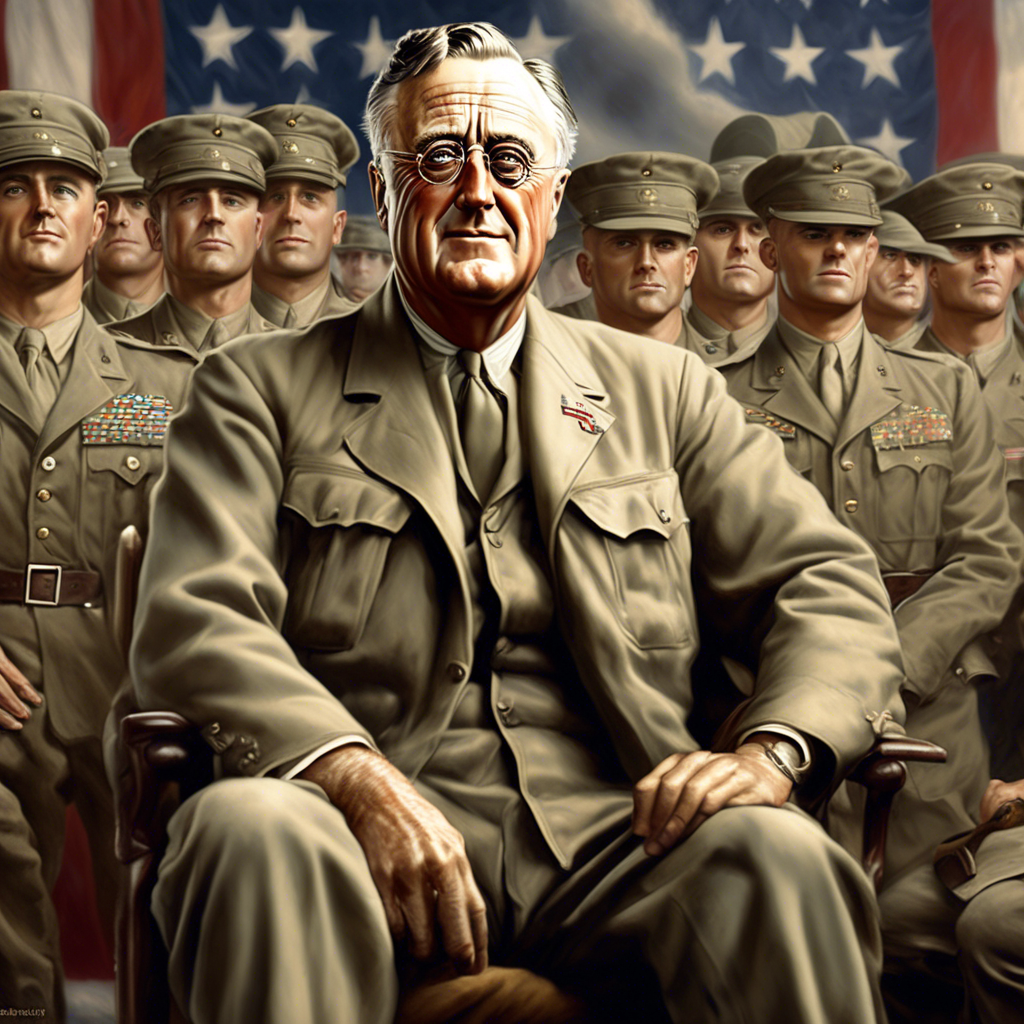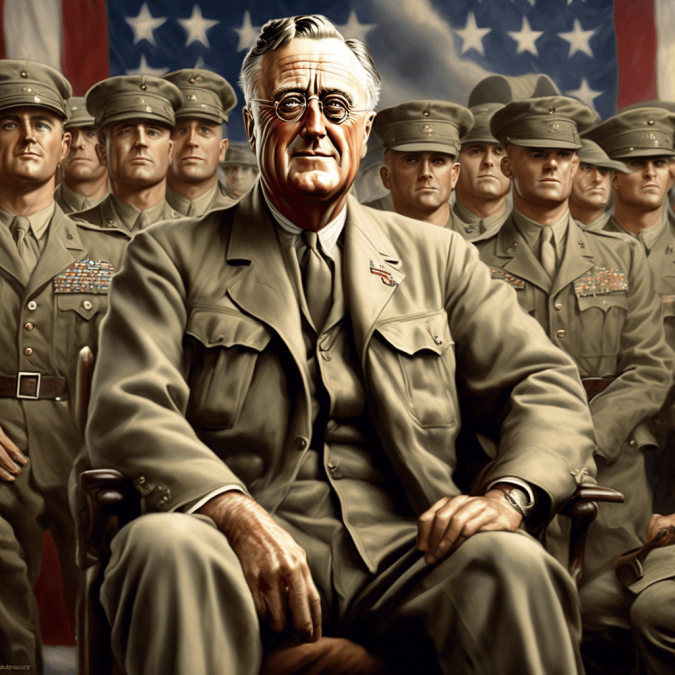
1. Introduction
Importance of understanding Franklin D. Roosevelt’s life and legacy
Franklin D Roosevelt presidency during the Great Depression and World War II reshaped American society and politics, laying the foundation for the modern welfare state and international diplomacy. By exploring his personal and political journey, we can gain insights into the challenges he faced, the decisions he made, and the lasting impact of his leadership on the nation and the world.
2. Background Information
Historical context of Franklin D. Roosevelt’s life
Born on January 30, 1882, in Hyde Park, New York, Franklin Delano Roosevelt came from a prominent American family with a long history in politics and public service. His upbringing amidst the Gilded Age and Progressive Era shaped his worldview and prepared him for a life of public service.
Overview of his family background and early life
The Franklin D Roosevelt family’s legacy of public service and philanthropy influenced Franklin’s sense of duty and commitment to social reform. His parents, James and Sara Roosevelt, instilled in him a strong work ethic and a belief in using privilege for the betterment of society.
3. Early Life and Education
Details about Franklin D. Roosevelt’s childhood
Franklin D Roosevelt early years were marked by privilege and tragedy, including the death of his father when he was a young boy. Despite these challenges, he developed resilience and empathy, traits that would shape his approach to leadership in later years.
Education background including schools and universities attended
Roosevelt’s education at Groton School and Harvard University prepared him for a career in public service. His legal studies and early exposure to politics laid the groundwork for his future political aspirations and leadership roles.
4. Political Career
Overview of Franklin D. Roosevelt’s political journey
Franklin D Roosevelt entry into politics as a New York state senator marked the beginning of a long and illustrious political career. His tenure as Assistant Secretary of the Navy and later Governor of New York cemented his reputation as a progressive and dynamic leader.
Key milestones and achievements in his political career
From his landslide victory in the 1932 presidential election to the implementation of the New Deal policies, Roosevelt’s presidency was marked by bold initiatives to combat the Great Depression and promote economic recovery. His leadership during World War II and advocacy for international cooperation reshaped the global order.
5. Presidency
Detailed account of Franklin D. Roosevelt’s time as President of the United States
Roosevelt’s four terms as President (1933-1945) were a period of unprecedented change and challenge for the nation. His fireside chats, executive orders, and legislative agenda transformed the role of the federal government in addressing economic hardship and social inequality.
Major policies, programs, and initiatives implemented during his presidency
The New Deal programs, including Social Security, the Civilian Conservation Corps, and the Tennessee Valley Authority, aimed to provide relief, recovery, and reform during the Great Depression. Roosevelt’s leadership in establishing the United Nations and advocating for the Atlantic Charter laid the groundwork for post-war peace and cooperation.
6. Personal Life
Insights into Franklin D. Roosevelt’s personal relationships, including marriage and family
Roosevelt’s marriage to Eleanor Roosevelt, a social reformer and diplomat in her own right, was a partnership based on mutual respect and shared values. His relationships with his children and extended family reflected his commitment to family unity and support.
Health struggles and impact on his personal and professional life
Roosevelt’s battle with polio, which left him paralyzed from the waist down, was a defining challenge in his life. Despite his physical limitations, he projected strength and confidence to the public, using a wheelchair and leg braces discreetly to maintain his public image.
7. Legacy
Assessment of Franklin D. Roosevelt’s lasting impact on American society and politics
Roosevelt’s legacy as a transformative president is evident in the enduring institutions and policies he championed, from Social Security to labor rights to banking regulations. His leadership during times of crisis and his vision for a more just and equitable society continue to shape American politics and governance.
Influence on future leaders and policies
Roosevelt’s example of bold and innovative leadership has inspired generations of leaders to tackle pressing social and economic challenges. His emphasis on empathy, pragmatism, and resilience in the face of adversity serves as a model for effective governance and public service.
8. Death and Aftermath
Circumstances surrounding Franklin D. Roosevelt’s death
Franklin D. Roosevelt passed away on April 12, 1945, while serving his fourth term as President. His death came at a critical juncture in World War II, leaving a nation in mourning and uncertainty about the future.
Immediate aftermath and legacy following his passing
Roosevelt’s death marked the end of an era and the beginning of a new chapter in American history. Vice President Harry S. Truman assumed the presidency and faced the challenges of completing the war effort and shaping the post-war world order in Roosevelt’s absence.
9. Conclusion
Summary of key takeaways from Franklin D. Roosevelt’s biography
Franklin D. Roosevelt’s life and leadership exemplify resilience, empathy, and visionary governance in times of crisis. From his early years to his transformative presidency and enduring legacy, Roosevelt’s contributions to American society and politics continue to resonate with the values of democracy, equality, and social justice.
Reflection on the significance of his life and contributions
As we reflect on Franklin D. Roosevelt’s life and legacy, we are reminded of the power of leadership to shape history and inspire positive change. His commitment to public service, his ability to connect with the American people, and his unwavering belief in the potential of government to improve lives have left an indelible mark on the nation and the world.
10. References
– Burns, James MacGregor. “Roosevelt: The Lion and the Fox.” New York: Harcourt Brace Jovanovich, 1956.
– Freidel, Frank. “Franklin D. Roosevelt: A Rendezvous with Destiny.” Boston: Little, Brown and Company, 1990.
– Goodwin, Doris Kearns. “Leadership in Turbulent Times.” New York: Simon & Schuster, 2018.
In conclusion, the biography of Franklin D. Roosevelt offers a compelling narrative of leadership, resilience, and vision in the face of adversity. From his early years to his presidency and enduring legacy, Roosevelt’s life serves as a testament to the enduring impact of bold and compassionate leadership. As we continue to grapple with social, economic, and political challenges, the example of Franklin D. Roosevelt provides a beacon of hope and inspiration for future generations of leaders and citizens committed to building a more just and equitable society.
